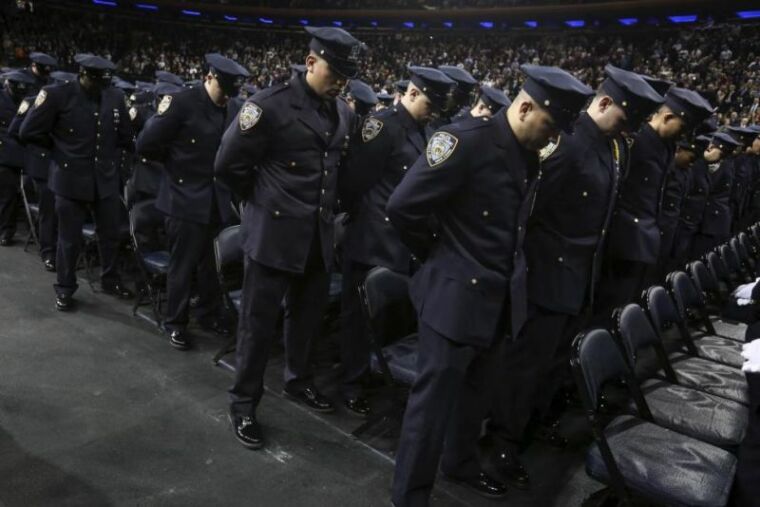NYPD now allows officers to wear turbans as religious accommodation

Sikh officers at the New York Police Department (NYPD) can now wear full turbans while on duty.
On Wednesday, NYPD Commissioner James O'Neill announced the new rule — officers can use a navy blue turban with an NYPD badge instead of the traditional cap worn by members of the force as long as they are able to obtain approval for religious accommodation from senior officers.
"We want to make the NYPD as diverse as possible, and I think this is going to go a long way to help us with that," O'Neill announced, adding, "It's a major change in our uniform policy, so we had to go about it carefully. And now I have the opportunity to make the change, and I thought it was about time that we did that."
Adult men practicing the Sikh religion wear turbans as part of their culture and identity. Before the new rule was put in place, Sikh NYPD officers wore a "patka" — a smaller wrap — under the usual NYPD cap.
In a tweet, the Sikh Officers Association conveyed their gratitude for the new rule, stating that "This is a proud moment for Sikh Community."
Additionally, NYPD is now allowing Sikh members of the force to grow their beard up to half an inch long as a religious accommodation. In the past, the limit for beard length was one millimeter.
As shared by O'Neil while speaking at a graduation ceremony for newly inducted officers at Madison Square Garden, the NYPD has about 160 Sikh officers. With the new rules on wearing a turban and beard length, more Sikh men are expected to join the NYPD.
NYPD joins the less than 10 police departments in the United States that have rules for religious exemption such as allowing the use of turban and allowing Sikh officers to grow their beard while on duty. Other bodies with similar rules include those of Washington, D.C., Riverside, California, and the U.S. Army.
Last April, Capt. Simratpal Singh, a decorated Sikh officer serving the United States Army, won the right to sport a beard and turban while in uniform after suing for religious discrimination. He told The New York Times, "Kids like me used to be told you can be anything you want to be, but you can't serve your country in uniform. That is no longer the case."
 Christians don't have to affirm transgenderism, but they can’t express that view at work: tribunal
Christians don't have to affirm transgenderism, but they can’t express that view at work: tribunal Archaeology discovery: Medieval Christian prayer beads found on Holy Island
Archaeology discovery: Medieval Christian prayer beads found on Holy Island Presbyterian Church in America votes to leave National Association of Evangelicals
Presbyterian Church in America votes to leave National Association of Evangelicals Over 50 killed in 'vile and satanic' attack at Nigerian church on Pentecost Sunday
Over 50 killed in 'vile and satanic' attack at Nigerian church on Pentecost Sunday Ukrainian Orthodox Church severs ties with Moscow over Patriarch Kirill's support for Putin's war
Ukrainian Orthodox Church severs ties with Moscow over Patriarch Kirill's support for Putin's war Islamic State kills 20 Nigerian Christians as revenge for US airstrike
Islamic State kills 20 Nigerian Christians as revenge for US airstrike Man who served 33 years in prison for murder leads inmates to Christ
Man who served 33 years in prison for murder leads inmates to Christ


 Nigerian student beaten to death, body burned over ‘blasphemous’ WhatsApp message
Nigerian student beaten to death, body burned over ‘blasphemous’ WhatsApp message 'A new low': World reacts after Hong Kong arrests 90-year-old Cardinal Joseph Zen
'A new low': World reacts after Hong Kong arrests 90-year-old Cardinal Joseph Zen Iran sentences Christian man to 10 years in prison for hosting house church worship gathering
Iran sentences Christian man to 10 years in prison for hosting house church worship gathering French Guyana: Pastor shot dead, church set on fire after meeting delegation of Evangelicals
French Guyana: Pastor shot dead, church set on fire after meeting delegation of Evangelicals ‘Talking Jesus’ report finds only 6% of UK adults identify as practicing Christians
‘Talking Jesus’ report finds only 6% of UK adults identify as practicing Christians Mission Eurasia ministry center blown up in Ukraine, hundreds of Bibles destroyed: 'God will provide'
Mission Eurasia ministry center blown up in Ukraine, hundreds of Bibles destroyed: 'God will provide' Church holds service for first time after ISIS desecrated it 8 years ago
Church holds service for first time after ISIS desecrated it 8 years ago Burger King apologizes for 'offensive campaign' using Jesus' words at the Last Supper
Burger King apologizes for 'offensive campaign' using Jesus' words at the Last Supper Uganda: Muslims abduct teacher, burn him inside mosque for praying in Christ’s name
Uganda: Muslims abduct teacher, burn him inside mosque for praying in Christ’s name